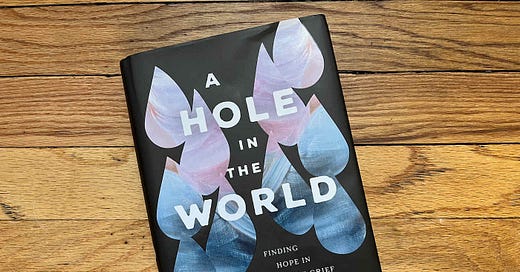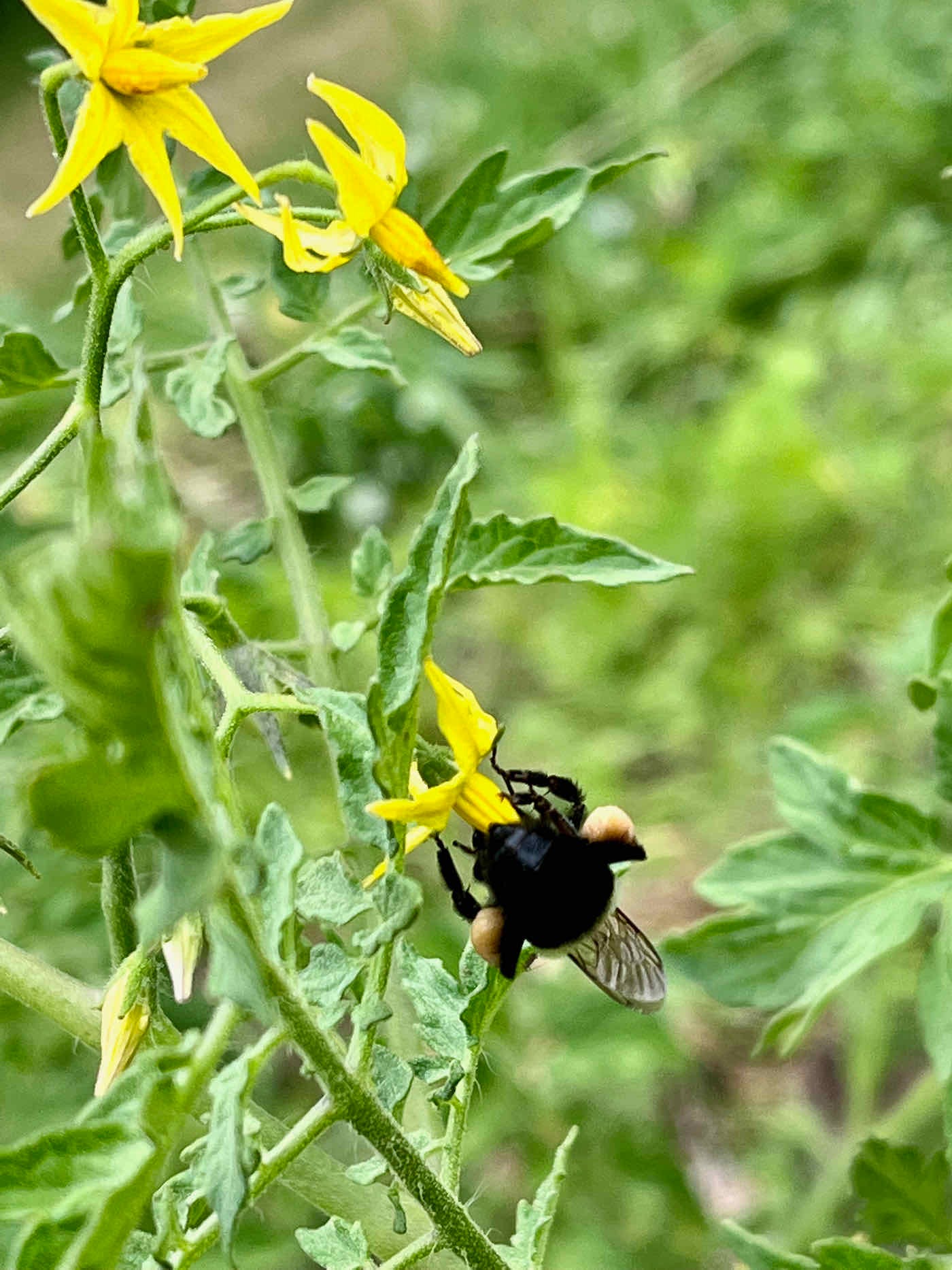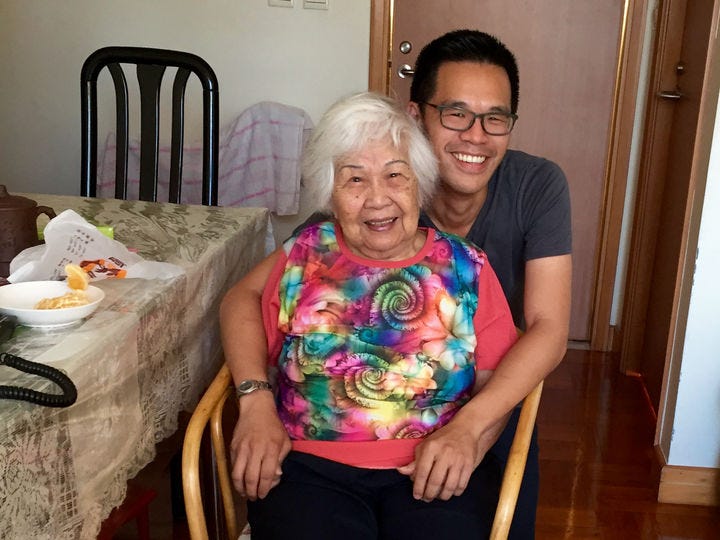"There Is No Life Hack for Grief"
Some fragmented thoughts on Amanda Held Opelt's excellent new book A Hole in the World, the experience of grief, a meditation on an old hymnal, and poetry in war zones
Thursday, July 21
Grand Rapids, Mich.
Hail be thou, dear reader.
In olden days, English speakers commonly greeted one another with terminology like this: “Hail be thou,” in medieval times, was a way of saying “be healthy” or “be well.” I’ve been thinking about the old ways as well as about what it means to be well because I’ve been reading Amanda Held Opelt’s excellent new book, A Hole in the World: Finding Hope in Rituals of Grief and Healing, which came out this week.
In the wake of three miscarriages and the deaths of her grandmother as well as her sister, Rachel, Opelt began pondering the place of grief in a society obsessed with ease and convenience. “If there’s a shortcut available, we’ll take it. If there’s a speedy solution, we’re sold,” she writes. “But there is no life hack for grief.”
It’s wishful thinking to imagine that we can rush past grief—understandable, yes, but still wishful. Whatever our cultural backgrounds, our ancestors seemed to understand that there was no way around grief, only through. “Generations past had a robust array of rituals surrounding death that allowed mourners to be fully present in the experience of bereavement,” Opelt writes. “These customs and traditions carved out a path and led the mourner through the physical, emotional, and spiritual exercises of saying goodbye.”
In A Hole in the World, Opelt examines twelve bereavement rituals. Some, like the bringing of casseroles and wearing black attire, were familiar to me; others, like Decoration Day, were not. The point of Opelt’s study is not to encourage nostalgia or to claim that things were once somehow better than they are now. Rather, it is to ponder the costs of a culture that is reluctant to face the reality of death—a culture that opts for celebrations of life rather than funerals, a culture that struggles to confront the brutality of war and the persistence of pandemic, a culture that prioritizes ease and convenience over the hard but faithful work of saying goodbye. “People are going to keep dying,” she said when I called her to chat a couple of weeks ago. “You never get to say, ‘Well, we’ve rounded the corner on this death thing.’”
Yet one of the most surprising things about A Hole in the World is how hopeful it feels. With winsome storytelling and a keen eye for detail, Opelt depicts the beauty of communities that gather to mourn together. Even as she urges us not to shy from the complexity of sorrow, she is never preachy and always pastoral. I imagine this is partly because of the deep compassion she has cultivated over many years as an aid worker. And it’s undoubtedly because, as a brilliant singer-songwriter, she is gifted at crafting elegant turns of phrase and soothing rhythms.
(One memorable song from Opelt’s repertoire: “Intercessions,” which she wrote for and sang at her sister’s funeral in 2019.)
One of the things I most appreciate about Opelt’s writing is that she resists platitude. She critiques pat phrases such as “This too shall pass,” which implies that grief is akin to a passing weather system that leaves no lasting trace of its visit. She confesses to being surprised by the unexpected new waves of grief. When her younger daughter, Lois, was born in the aftermath of Rachel’s death, “it felt like Day 1,” she told me. The thought struck her: “I have a baby that Rachel will never know.” It was startling to confront anew the particularities of the absence of someone whom she had imagined would be alongside her for decades to come: “New losses, new moments to grieve, keep unfolding and unfolding and unfolding.”
Which is not to say that she believes the grieving are sentenced to a life in sackcloth. “I don’t want people to misunderstand: I’m not saying it never gets better or more manageable,” she told me. “It does stay with you, because everyone we love is mortal, and the world is going to keep being terrible. But you do develop the skills that are needed to tend to that hurt when it arises. Your strength emerges to meet the pain.”
Sometimes that strength comes through the collective wisdom of our ancestors—the ones who developed rituals and practices into which we can channel our sadness. The point, after all, is not to encourage the reader to dwell in oppressive morbidity or to sit in endless shiva. Rather, it is to explore how rituals can help us process grief.
Telling the bees, for instance, is an old European and American practice of unclear origin. In 19th century England, a mourner might tap a beehive three times before announcing a death—perhaps by singing a song or reciting a poem. Perhaps there’s some science behind it; bees, like many animals, have an uncanny ability to sense the mammalian pheromones we release when we are fearful or upset.
The day before Opelt and I talked, I’d spent some time in the community garden, and I’d whiled away a good twenty minutes watching the bees visit my tomato plants. There’s a particular mystery to being in the presence of a creature with whom it’s nearly impossible to communicate—and it’s striking to me that, for centuries, people have felt they ought to talk to bees. Perhaps it’s a way of acknowledging community and interdependence, even among species. Odd as it might seem, why shouldn’t a hive be told of the death of its keeper?
Opelt speculates that a discomfort with mystery and indeed a fear of superstition help to explain why some rituals have faded away—especially ones like covering mirrors, a tradition that reflected uncertainty about whom death might next visit. We’d like to think we know better now. And modernity has often tag-teamed with religion to crowd out mystery. “We see ourselves as people with answers, as people who understand why the world is the way it is,” she told me. She finds this to be particularly true of the strain of American evangelicalism in which she was reared: “I wish I had been handed the gift of mystery growing up, instead of being told the best way to represent Christ is to have all the answers.”
When my maternal grandmother died in 2017, I flew back to Hong Kong for the funeral. I remember how, in the days before the service, my aunts and uncles wrestled with what traditional Chinese practices were acceptable to include and which were not. I explained to Opelt that we struggled to know how to grieve, because the adoption of Christianity as our family’s faith had also required the shedding of rituals that were seen by the American missionaries as “heathen.” One member of our extended family, an ordained Baptist minister, insisted that, as Christians, we ought to grieve differently, because we had a kind of hope that we once had not.
“The Christian messaging is primarily let’s not grieve as those who have no hope. But sometimes people basically put a period after ‘grieve,’” Opelt said after listening to my story. “I can understand the Church wanting to assuage people’s fears and not lean into superstitions that indulge our fears. But sometimes it also suggests that you’re not allowed to feel sad either. And that’s where I think things go wrong.”
In one of the book’s most intriguing passages, Opelt writes that grief “is where we meet our truest selves.” Which of course prompted me to wonder what she had learned about her truest self. Through grief, she said, “I learned some things that I don’t love about myself. I learned that I live with a lot of low-grade fear that I disguise with confidence and optimism.” But she also realized that there were aspects of herself that she liked quite a bit: “I am a strong person. I didn’t know if I’d be able to endure this kind of loss—and maybe it’s not that I ever thought of myself as weak. I just didn’t know what it would take to bear up under this loss.”
It doesn’t surprise me that grief should kindle new self-understanding, but it did surprise me that immediately after making that claim about our “truest selves,” Opelt makes an even bolder one: Grief, she writes, is where we are met by God. She offers this statement with little explanation, so I wanted to know her basis for it.
“It was not in the way that I would have thought,” Opelt replied. “I thought God would show up in comfort--in the palliative way, to make everything feel better. But instead, He showed up in a more fortifying way: Death is going to be terrible. I can’t make it any less painful. But I can strengthen you to endure the pain and give you wisdom and insight and clarity.”
In her grief, Opelt found herself considering different aspects of God. “I have never thought about the sadness of God as much as when I was grieving,” she said, naming “the God who lost a son, the God who has had severed relationships, the God who wailed and mourned and called others to mourn.” She had never before sought to deepen her understanding of “God as a griever—God who subjected himself to death.”
It’s a particular gift that, amidst grief, Opelt, in her own way, does what the venerable rituals did: Through A Hole in the World, she creates a communal vessel for sorrow. It is a remarkable testimony to her perseverance as well as to her heart for others.
But grief isn’t just about persevering through pain. It also calls us to be open to change—to reckon with the reality of the goodbyes and to receive invitations to new ways of moving through the world. Opelt notes the importance, in the aftermath of loss, of savoring life. “I won’t give death another inch,” she writes.
It might not be a lesson she wanted, yet here it is nonetheless. Throughout these summer months, she is relishing the storytelling of the mountains that surround her North Carolina home, from the days spent picking blueberries to the nightly dance of the fireflies. She is also wrestling with the odd truth that the pain of death can cast into sharper relief the beauty of life. “I am savoring watching my two girls get to know one another as sisters in spite of the fact that it brings back a lot of memories. It’s really beautiful even though it comes with the pain of the reminder that my sister didn’t live to be more than 37 years old,” Opelt told me. “I’m just enjoying them learning how to be sisters, even though it comes with conflict sometimes.”
I asked Opelt if she had any word of solace for those who are facing grief and loss. Each experience of sorrow is unique, each goodbye laced with layers of longing. She paused for a while before answering. “Give yourself permission to be shattered,” she finally said. “Give yourself permission to feel awful and to acknowledge how bad and how hard it is.” And while she doesn’t think that grief ever entirely disappears, neither does she believe it to be the end of the story. “You will find a way forward,” she said. “Alongside the intensity of the suffering, you will figure out how to experience joy.”
May it be so.
What I’m Reading: I will read anything that Vinson Cunningham writes. For the Family Issue of The New Yorker, he offers a moving reflection on a childhood hymnal. It summoned for me the memory of the hymnals that my grandparents brought with them from Hong Kong. By the time I entered their lives, the paperback volumes had grown frayed, the orange, plasticized covers cracking.
Another favorite article this week: the New York Times foreign correspondent Alissa Rubin’s meditation on the place of poetry in a war zone. She reflects beautifully on the companionship that verse can provide amidst conflict. Poetry, she writes, “calls on us to find the humanity amid the brutality, to pay attention to the details, and shows us how the smallest thing can be infinitely large, that it can convey tragedy but also remind us that beauty still exists, that there can be life even in the rubble — and, yes, even love.”
What’s on your summer reading list? What have you read recently that you’d recommend, whether it has deepened your understanding of the world or simply brought you some delight?
If you’re in Grand Rapids, I will be preaching this Sunday, July 24th, at Sherman Street Christian Reformed Church. Worship begins at 10:30 a.m. ET. If you’re not in Grand Rapids and/or would rather join us online, here’s the link to the Zoom livestream. Some of you who have been following the news of denominational shenanigans might be surprised that I’m preaching at a CRC church. Sherman Street voted in late 2020 to become an open and affirming congregation. You can read its statement of full inclusion of LGBTQ+ people here.
As always, I’m so glad we can stumble through all this together, and I’ll try to write again soon.
Yours,
Jeff







Geraldine Brooks Horse
Delightful novel based on true story about enslaved groom and bay foal that cary the horse to record setting victories in South. Story of horse based in Lexington initially, which is near where I live. Really goes deep into exploring the role of Black trainers jockeys had in horse racing before Civil War. Book about race, humanity, love of animals — and the complexity of our lived history together, and how it impacts each of us today.
I recently read Rachel’s book Inspired. Her section called Resistance Stories inspired me to dive deeper in various directions of oppression. I picked up a book called The Abolitionist Movement by Elaine Landau. It isn’t very long, but it was so informative. I learned a lot that felt important to the present time, and all time really. Especially in regards to faith and bravery to share the truth of scripture in the face of oppression.